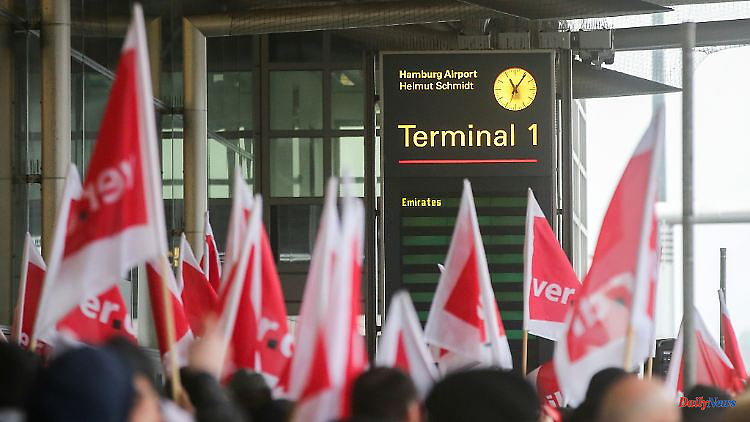The warning strike in seven German airports has had a major impact: the terminals in Munich and Frankfurt am Main are utterly empty. Verdi explains that this is just a foretaste of a hot spring. Employers are outraged.
Whistle whistles rang out through Terminal 1 of Frankfurt Airport instead of the usual loudspeaker announcements. Only very few passengers have strayed to Germany's largest airport, but more and more employees are protesting loudly and resolutely for higher salaries and better facilities. The all-day warning strike by the Verdi union at seven German airports is having an effect. It could be a first taste of more labor disputes and disruptions to air traffic as the year progresses.
Twelve emergency flights instead of the planned 1005 flight movements is the daily balance sheet in Frankfurt. Hardly anything flies in Munich, Hanover, Stuttgart, Bremen, Hamburg and Dortmund either. Even at airports that are not under strike, such as Berlin, there are some restrictions as a result of the warning strikes. Despite the start of the holidays in Baden-Württemberg and Bavaria, there is no chaos there either. According to estimates by the airport association ADV, almost 300,000 passengers are affected by a good 2,340 flight cancellations. "We have a very quiet day in the airspace," a spokesman for German air traffic control describes the situation. For Saturday, DFS expects a slightly higher volume, especially because the approaches from the USA have been postponed.
The warning strike ended on Saturday, but the wage dispute in the public sector has by no means been resolved. Verdi boss Frank Werneke threatens before the next round of negotiations in the "Frankfurter Allgemeine Sunday newspaper": "The next strikes will have a different dimension." If the employers come up with a really good offer next week, an agreement can be reached quickly. Otherwise, the current warning strikes are only a foretaste. Labor is still scarce at airports. If conditions don't improve, handling chaos like last year can hardly be avoided, warns Verdi Vice President Christine Behle. In front of around 3,000 protesters in Frankfurt, trade union secretary Christoph Niemitz had a catchy sentence ready: "Inflation is eating into the wallets of the employees. The employer can no longer find staff and yet they don't take a step towards us. How can you be so stupid!"
Lufthansa has already trimmed its 2023 summer flight schedule with a view to staff. "Currently, the personnel bottlenecks in the industry across Europe have not yet been completely overcome," says a spokesman in Frankfurt. It is therefore preferable to take flights out of the program now rather than having to cancel them at short notice like last year. The passengers could plan better that way. In 2022, with the ebbing corona pandemic, the sharp increase in demand had pushed the industry to its limits. The consequences were delays and cancellations as well as long waiting times, for example at baggage claim and security checks.
Verdi and the civil servants' association DBB are demanding 10.5 percent more income in the public service wage dispute, but at least 500 euros more for the approximately 2.5 million federal and local employees. An offer from the employer has not yet been received. In addition to public service, the warning strikes at the airport also involved local collective bargaining for ground handling services and a nationwide round of collective bargaining for 25,000 employees in aviation security.
Lufthansa wants to leave the Verdi warning strike behind as quickly as possible. "We will start regular operations again immediately on Saturday," said a spokesman. On Friday, however, the largest German airline had to cancel around 1,300 flights - after just overcoming an IT malfunction caused by an excavator at a railway construction site on Wednesday. Ironically, the railways benefited and also brought a number of short-distance passengers to their destinations in fully occupied trains.
The airport association ADV spoke of an "unprecedented escalation" given the extent of the strike. There is also sharp criticism of the union from medium-sized companies. "It is unacceptable that Verdi lives out its collective bargaining demands on the back of the entire German economy," said Markus Jerger, head of the Federal Association of Small and Medium-sized Businesses. Verdi had declared that emergency services would exempt relief flights to the Turkish-Syrian earthquake area from the strike. In addition, aid supplies could be flown out via Frankfurt-Hahn Airport, which is not under strike. Disruptions such as those caused by this strike cannot always be compensated for, however, emphasized the Barig association, which represents the interests of foreign airlines in Germany. Humanitarian aid deliveries are highly sensitive logistics chains.
Nevertheless, a new air bridge was set up from Germany to the Turkish earthquake areas during the course of the day. Two Lufthansa Cargo planes took off from Frankfurt with relief supplies to Antalya. From Monday, the German-Turkish company SunExpress will be flying to Antalya on Mondays and Tuesdays with a passenger plane that has been converted purely for freight transport. From Monday, aid packages for the earthquake victims can be handed in free of charge in the approximately 7,500 DPD parcel shops.
For the guests of the Munich Security Conference, the airport made an exception to the suspended flight operations. "All private flights registered for the MSC will be accepted and processed," said an airport spokesman. The Munich Security Conference is considered one of the most important meetings of politicians and experts on security policy worldwide. A total of 40 heads of state and government and almost 100 ministers are expected.












